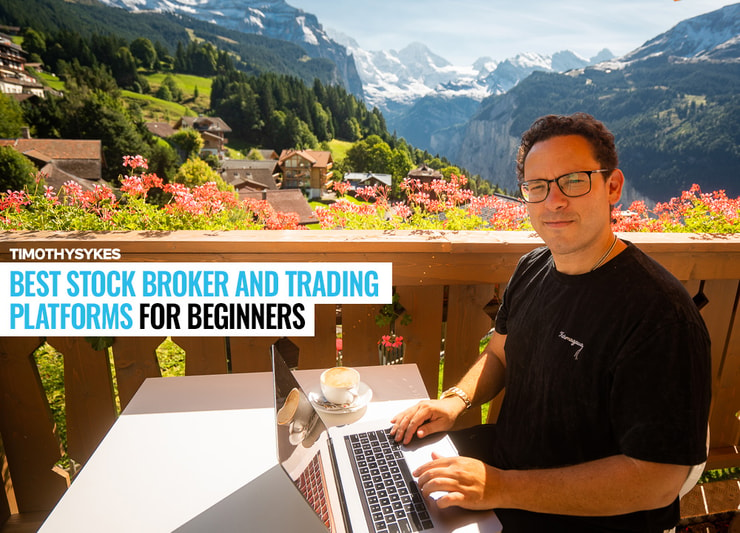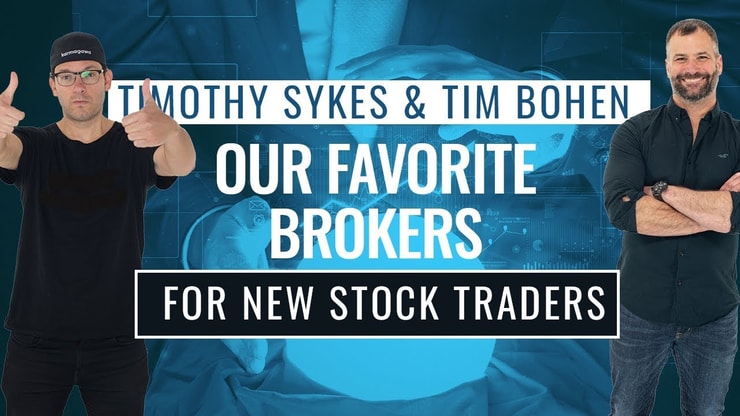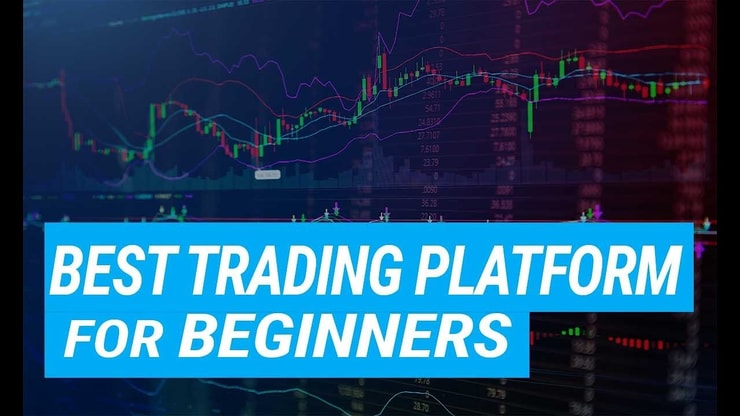The best stock broker and trading platforms are those that offer a blend of robust features, user-friendly interfaces, and comprehensive educational resources.
What’s the best day trading platform and broker for you?
That’s kind of a big question…
As a day trader, your broker and trading platform are the most important things in your arsenal. They’re your gateway to executing trades, so it’s important to find ones that suit your needs.
There’s only one platform I truly love (more on that in a bit) … but these days everyone wants options, right?
Read on to find out about some of the best day trading platforms and brokers available, why they matter, and what you should look for before you choose!
Table of Contents
- 1 What Is a Trading Platform?
- 2 How Day Trading Platforms Work
- 3 What Does a Stock Broker Do?
- 4 What Do You Need for a Brokerage Account?
- 5 How to Choose the Best Day Trading Platform for Your Strategy
- 6 Top Trading Platforms for Day Traders
- 7 TD Ameritrade
- 8 E-Trade
- 9 Fidelity
- 10 Interactive Brokers
- 11 Best Online Stock Brokers for Beginners
- 12 Best Day Trading Software Providers
- 13 How Day Traders Use Their Broker
- 14 How to Invest in Stocks: Best Ways for Beginners to Get Started
- 15 Picking The Best Online Brokerage Account
- 16 The Bottom Line
What Is a Trading Platform?

Even the most talented Olympic diver couldn’t win the gold if they didn’t have a sturdy diving board to jump from.
To truly excel in day trading, it’s crucial to understand its foundation. Day trading isn’t just about buying and selling stocks rapidly within a day. It’s a strategic process that requires knowledge of the market, understanding of various strategies, and the ability to make quick decisions. A trading platform is just a tool that facilitates this process. To get a deeper understanding of day trading, check out this comprehensive guide on Day Trading Basics.
As a day trader, you can think of your day trading platform as your diving board. It doesn’t do all the work for you, but it’s the starting point from which you leap into trades.
A trading platform is software that allows you to manage your market positions through a third-party facilitator. You can open and close positions through the platform, as well as manage them.
How Day Trading Platforms Work
These days, day trading platforms are typically online. Many are offered by brokers. The platforms may be free in exchange for maintaining an account with the broker.
If you believe there’s no such thing as free lunch, you’re right to be wary. There may be stipulations to keep the platform fee-free, such as maintaining a specific monthly balance or conducting a certain number of trades per month.
While a trading platform is technically as simple as that, many platforms offer additional bells and whistles to attract traders. A good trading platform should have a user-friendly interface, reliable customer support, and advanced features like stock scanners.
Stock scanners are essential tools that help traders filter out stocks based on specific criteria. They can save you a lot of time and help you focus on stocks that meet your trading strategy.
If you’re not sure how to use stock scanners on your trading platform, don’t worry. Here’s a detailed guide on How to Use Stock Scanners to help you get started.
What Does a Stock Broker Do?
A stock broker is your ticket to the world of investing. They’re the middlemen, the gatekeepers who grant you access to the stock market. They handle your trades, buying and selling stocks according to your instructions. But that’s just the tip of the iceberg. They’re also a treasure trove of information, providing research, analysis, and advice to help you make informed decisions. They can be your guide in the complex world of stocks, bonds, ETFs, and more.
But not all brokers are created equal. Some cater to experienced traders with a variety of tools and resources, while others are more suited to beginners, offering user-friendly platforms and educational content. It’s all about finding the one that fits your needs and goals.
And remember, a good broker doesn’t just execute trades. They’re your partner in investing, helping you navigate the market and reach your financial goals. So choose wisely.
What Do You Need for a Brokerage Account?
Opening a brokerage account is like getting the keys to your financial future. But what do you need to get started? First, you’ll need some basic personal information — think Social Security number, employment details, and financial information. It’s all part of the process to ensure your account is secure and compliant with regulations.
Next, you’ll need to decide what type of account you want. Are you looking to trade stocks, options, or ETFs? Or maybe you’re interested in bonds or commodities? Different accounts offer different features, so it’s important to choose the one that aligns with your investment goals.
Finally, you’ll need to fund your account. Most brokers have a minimum deposit requirement, but don’t let that scare you off. There are plenty of brokers out there with low or even no minimums, making investing accessible to everyone.
Types of Brokerage Accounts
When it comes to brokerage accounts, one size doesn’t fit all. There’s a range of options out there, each with its own features and benefits. Let’s break it down.
First, there’s the standard brokerage account. This is your basic trading account, allowing you to buy and sell stocks, bonds, ETFs, and more. It’s a flexible option, with no restrictions on when you can access your money.
Then there’s the retirement account, like an IRA or 401(k). These accounts come with tax advantages, but also have restrictions on when you can withdraw your funds without penalty.
Finally, there are managed accounts. These are for investors who prefer a hands-off approach. With a managed account, you’ll have a professional managing your investments for you. It’s a convenient option, but it comes at a cost, with higher fees than self-directed accounts.
Remember, the best type of account for you depends on your individual needs and goals. So take the time to do your research and choose wisely.
Is My Money Safe in an Online Brokerage Account?
In the digital age, safety is a top concern. Rest assured, your money is generally safe in an online brokerage account. Brokerages are heavily regulated and required to keep your funds separate from their own. This means even if the brokerage goes under, your money is still yours.
But what about cyber threats? Brokerages take this seriously too. They use high-level encryption and other security measures to protect your account. Plus, many offer additional protections like two-factor authentication and automatic logouts.
However, remember that while your account is safe, investing always carries risk. The value of your investments can go up and down with the market. So while your money is safe from theft or bankruptcy, it’s not immune to losses.
More Breaking News
- RITR’s Strategic Moves Signal Potential Growth Amidst Market Challenges
- Vizsla Silver Shows Resilience Amid Unsteady Market
- Credo Technology Unveils AI Retimer Amid Strategic Partnerships
- Needham Upgrades Ichor Holdings to Buy Amid Positive Forecasts
How to Withdraw Money From a Stock Broker
So you’ve made some profit and want to enjoy the fruits of your investment. How do you get your money out? It’s simple. Most brokers allow you to withdraw funds directly to your bank account. Just log into your account, choose the amount you want to withdraw, and voila, the funds should be in your bank account within a few days.
But remember, while withdrawing is easy, it’s important to have a plan. Regularly taking out money can impact your investment goals. So before you withdraw, consider your long-term strategy and how it fits into your overall financial plan.
How to Choose the Best Day Trading Platform for Your Strategy

Consider multiple factors when choosing the best day trading platform for you…
What indicators do you look for in trades? Do you focus on highly volatile stocks — like penny stocks? Are you short or long biased?
Yep, a lot goes into picking a broker.
For example, Robinhood may have no commission fees, but its trading execution is allegedly extremely slow. You might end up losing trades while waiting for your orders to execute.
For the record, these are the brokers I use.
Why It’s Important to Choose the Right Platform
What really matters when choosing among all the trading platforms for day traders?
First, you need a trading platform that suits your style. Second, choose a platform that offers the resources you want and need in your trading.
For example, if you rely on Level 2 quotes or in-depth charting tools, stick to platforms that offer that resource.
Or consider the availability of hot keys. Hot keys are keyboard shortcuts that allow traders to execute trades quickly. This can be especially useful in day trading where speed is of the essence. Different platforms offer different hot keys, so it’s important to familiarize yourself with them before you start trading.
To learn more about hot keys and how they can enhance your trading experience, check out this article on Hot Keys.
And consider the specific rules or limitations of your platform.
For instance, if the platform in question requires a certain number of trades per month to remain ‘free,’ consider how well that works for you. You don’t want to start bleeding your account in little ways!
Also, take specific care when choosing a platform offered directly from the broker…
- Is it a well-respected broker?
- Do they have good reviews?
- How much do you trust them?
I should note that while many platforms are attached to a specific broker, that’s not always the case.
StocksToTrade is a stand-alone platform that has broker integration. This means you can use its tools and pair it with a variety of different brokers. Its Breaking News Chat add-on feature is a game-changer.
Spoiler: This is my go-to platform. I use StocksToTrade every day to scan for gainers, news, check charts, and so much more.
It fits the penny stocks I trade because I helped design. And I’m a proud investor in it.
It has the trading indicators, dynamic charts, and stock screening capabilities that traders like me look for in a platform. It also has a selection of add-on alerts services, so you can stay ahead of the curve.
Grab your 14-day StocksToTrade trial today — it’s only $7!
Yes, there are other options, so let’s break down the…
Top Trading Platforms for Day Traders

There’s a wide variety of trading platforms out there, each a little different.
So … which is the best for you? Of course I can’t answer that. But here are some decent contenders.
TD Ameritrade
Benefits of Choosing TD Ameritrade
Many say TD Ameritrade is the best trading platform for day traders.
I’ve used TD Ameritrade and know some traders who swear by it.
It’s soon going to merge completely with Schwab. But for now, TD Ameritrade is one of the biggest and well-known brokers out there. It’s a publicly traded broker, with millions of users and hundreds of thousands of trades executed daily.
And it’s generally well regarded and respected. As a broker-platform bundle goes, it has a decent reputation. Here are a few reasons why…
Trading Platform for Day Traders
Sometimes, a broker that also offers a platform falls into a sort of ‘jack of all trades, master of none’ sort of situation. But TD Ameritrade reportedly does a good job on both fronts.
TD Ameritrade’s trading platform thinkorswim was a separate entity until 2009 when TD Ameritrade took it over. In terms of platforms, it’s considered one of the biggest and best.
On the platform, you can trade stocks, options, futures, forex, and other securities. They feature chat rooms and daily programming offered by TD Ameritrade professionals.
They also offer a bunch of nice touches, including live-streaming CNBC to keep track of the news, an interactive market calendar that helps you access events, and the ability to link your desktop and smartphone so that you can sync the symbol you’re viewing on both.
TD Ameritrade Fees
TD Ameritrade has no subscription or platform fees, and there’s no minimum cash deposit amount required to open or maintain an account.
Recently, TD Ameritrade dropped its flat-rate fee from $6.95 per trade to $0. This has drawn in many traders looking to save on fees.
However, there’s still a flat-rate fee of $6.95 for trading any OTC stocks.
Order Execution Time and Customer Service
When it comes to order execution time and customer service, TD Ameritrade gets a thumbs up in both departments from many reports.
Traders say the platform is reliable and fast, so orders will likely go through in a timely fashion.
Customer service also seems to be responsive. The team is available 24/7 and can be contacted in multiple ways. You can call in and talk to a real person or use its live-chat feature.
Stock Chart Analysis with TD Ameritrade
One of the biggest draws for TD Ameritrade is its stock chart analysis tools.
Fundamental and technical analysis are important for trading survival and consistency. My Trading Challenge focuses partly on day trading patterns and identifying trends. Charts are key for my strategy.
With TD Ameritrade, you’ll get access to plenty of charts with real-time data, and the charts include technical information and studies you can tailor to your needs.
You can use any number of built-in indicators, and you also can create your own indicators, as well (if you don’t have the capability, there are plenty of developers who make them, too).
It’s reliable and advanced but also pretty user-friendly and easy to customize. So a lot of traders report liking this platform.
Disadvantages of Choosing TD Ameritrade
With every broker, there are pros and cons.
That’s why I’ve tried so many. And I found the ones that suck the least for my trading style.
Even though TD Ameritrade has lots of positive reviews, there are a few downsides to using this platform to trade…
Short Selling
I don’t consider TD Ameritrade to be great for shorting. I think it’s better for buying, and that’s primarily how I have used it.
So how do I handle the problem of shorting? First of all, I don’t short much these days. It’s overcrowded and risky right now.
I don’t use TD Ameritrade much anymore, but when I did, I had multiple accounts — a TD Ameritrade for buying and a different account for shorting.
TD Ameritrade doesn’t have an account minimum, so there aren’t many problems with maintaining multiple accounts.
Options Trading Fee
Personally, I don’t trade options. But my millionaire student Mark Croock does. And for anyone who does, TD Ameritrade has a fee of 65 cents per contract. That’s higher than other brokers that allow free options contracts.
65 cents per contract is still extremely low, but with a free option at other brokers, you might want to look elsewhere for options trading.
Check out my student Mark Croock and his Evolved Trader options trading course here.
E-Trade

Benefits of Choosing E-Trade
Another popular broker is E-Trade…
E-Trade is largely beloved and many will say it’s the best trading platform for day traders.
As a broker, E-Trade is well respected. I find it better for selling short, but it offers the ability to trade the same equities as TD Ameritrade.
As a platform, it has plenty to offer. You can analyze and trade stocks, options, ETFs, and futures from the web or virtually any tablet device.
Here are some specific benefits …
Advanced Mobile Trading
One of the biggest draws for a lot of traders when it comes to E-Trade is its mobile apps. They get good reviews.
They have two different mobile trading options: E-Trade mobile, and the advanced mobile trading app, OptionsHouse.
E-Trade mobile is respectable. It gives you access to your account, real-time quotes, charts, and streaming news. You can execute trades, and from some operating systems you can execute more advanced trading.
The OptionsHouse app lets you take your mobile trading to the next level, with customizable features, interactive charts, technical analysis, and more.
OptionsHouse is the mobile companion to its web-based platform of the same name.
As a mobile platform, it’s incredibly powerful and detailed so you can keep up with trades, even when you’re away from your computer.
You can use interactive charting software and technical studies from your phone or tablet, and get real-time market quotes in streaming time. There’s also news, earnings, gains, and more. So you have plenty of tools to do your research on your phone.
You can trade and modify orders right from the platform, so as a one-stop mobile shop, it’s got a lot to offer.
E-Trade Fees
In terms of fees, E-Trade is comparable to other brokers…
First off, you need a minimum balance to open an account with E-trade. It’s only $500, which isn’t too much, but it’s definitely more than TD Ameritrade, which doesn’t have a minimum.
The trade fee is $6.95, with active traders receiving a discount of $2. How do you score this discount? “Active trading” is defined as 10+ trades per month, which for some traders is a snap, for others a stretch. So keep this in mind.
While the fees are on the higher side, they’re not underhanded about it. It’s easy to find all of the fees listed on its website.
Order Execution Time and Customer Service
E-Trade also gets a good rating for both order execution time and customer service.
The platform is fast and dependable, so you can stress less about your orders going through in a timely fashion. This goes for both mobile and web-based platforms.
E-Trade’s customer service is available by phone, email, chat, and at its branches — if you happen to be close to one.
Stock Chart Analysis With E-Trade
E-Trade has plenty of resources to assist with your stock research.
First off, it has a nice-sized library of learning materials so you can guide yourself through some of the basics of the stock market and trading.
Its resources are largely more general though.
In terms of charting, OptionsHouse is good. It used to be a stand-alone platform, but E-Trade acquired it in 2016. It has a lot of data, a wide variety of charting tools, technical studies, easy-to-execute market orders, customizable options, and more.
Then there’s E-Trade Pro. It’s similar to OptionsHouse but it has a few different features that traders seem to like.
Disadvantages of Choosing E-Trade
There are a few fees included with E-Trade that active traders might consider disadvantages.
But you can get a list of all the fees easily. Do your research before committing to this brokerage (or any broker for that matter), so you won’t be disappointed.
ECN Fee
For day traders who like extended hours trading, there is a $0.005 per share surcharge. This isn’t much, but it can be a disappointment to active extended-hours traders.
As a teacher, I tell beginner traders to stay away from extended-hours trading. Premarket and after-hours trading have less volume, more volatility, and don’t follow my top patterns quite like regular market hours.
Fidelity

Benefits of Choosing Fidelity Trading Platform
Fidelity gets overall high reviews from traders. It has a great reputation for mutual funds and other funds.
I know that day traders aren’t looking for brokerages with good mutual fund reliability though… The good thing about Fidelity is that it has other strong suits too that apply more to day traders.
Fidelity works to upgrade their platform to keep with the times. If there’s a new idea on any platform, Fidelity probably won’t be too far behind with updating their platform.
Commission Free Stock Trading
Commission-free trading has become one of the biggest factors for most traders ever since Robinhood came around and changed the game.
Fidelity hopped on the bandwagon of commission-free trading too. Investors and traders are now able to save a few dollars per trade and love it.
Customizable News Feed
Fidelity has added customizable news feeds for their clients.
The news feeds can be sorted by watchlist or holdings.
I prefer the new and social media feeds on StocksToTrade. And Breaking News Chat has helped me nab some of the hottest trades in 2023. I’m now up over $7.4 million in trading profits.
Give Breaking News a try today — a 14-day trial of StocksToTrade and Breaking News Chat is only $17!
Disadvantages of Choosing Fidelity
One reason I don’t consider Fidelity the best for day trading is because they’re more focused on long-term investments over day trading.
They’re one of the top brokers for mutual funds for a reason. They focus most of their time and money on improving aspects pertaining to funds.
As a day trader, it’s not the best sign when the brokerage cares more about mutual fund investors than they do about day traders.
Interactive Brokers

Benefits of Choosing Interactive Brokers
Even though this is the fourth broker in this post, Interactive Brokers and E-Trade are my personal favorites for my trading style.
For me, Interactive Brokers has proven to be one of the top brokers for day trading. I’ve found it has quick executions and reliable services.
Not everything about it is perfect. But since I’m experienced in the stock market, Interactive Brokers sucks the least for me.
Short Selling
I used to be a short-biased trader. Now I tell my students to be very cautious while short selling.
Short selling used to be predictable and fairly safe. These days short selling is too risky. The short squeeze is real and can take you out of the game fast. You have to be meticulous in all trading — but especially in short selling.
Interactive Brokers has a good amount of borrows for short sellers though. Especially for stocks under $2 a share. But do your own research on shorting with this broker — or any other. There may be additional fees.
Worldwide Access
Some of these brokers I’ve mentioned only operate in the U.S. or a few other countries. Interactive Brokers allows clients from so many countries.
I have students in over 100 countries worldwide and it’s great that they can use a reliable broker and not some sketchy offshore crap.
Disadvantages of Choosing Interactive Brokers
The biggest disadvantages that I’ve seen with Interactive Brokers deal with their fees.
They have fees for almost everything and it adds up.
For me, the fees aren’t that big of a deal. I care about quality over how cheap it is. The problem comes for my students who have small accounts and the fees eat into their capital. But I think fees can help prevent overtrading. That’s a good thing if you want to stay in the game.
Inactivity Fee
For any trader who isn’t constantly trading at least monthly, inactivity fees can add up.
This can be a problem for newbies because they should be studying not overtrading. I tell my students to study hard and start small once they gain confidence.
Inactivity fees can lead to overtrading — no trader wants to get charged for not trading.
Best Online Stock Brokers for Beginners

If you’re new to trading, the right broker can make all the difference. Here are some of the best online stock brokers for beginners:
- Robinhood: Known for its user-friendly app and commission-free trades, Robinhood is a favorite among new investors. It offers a simple platform that’s easy to navigate, making it a great choice for beginners.
- TD Ameritrade: With a wealth of educational resources and a top-notch trading platform, TD Ameritrade is perfect for beginners looking to learn the ropes. Plus, with no account minimums, you can start investing with whatever you have.
- E-Trade: E-Trade combines a robust trading platform with a wide range of investment options. It’s a bit more advanced, but its educational content makes it a solid choice for beginners ready to take the next step.
- Fidelity: Known for its customer service and research tools, Fidelity is a reliable choice for beginners. It offers a wide range of investments and a user-friendly platform.
- Charles Schwab: With a strong reputation and a wide variety of services, Charles Schwab is a solid choice for any investor. Its educational content and customer service make it especially beginner-friendly.
Best Day Trading Software Providers
Yeah, I know. I said this already … but StocksToTrade is my favorite platform. Designed by traders for traders, this is the ultimate software for scanning and research. I even helped with its design, so it suits the stocks I trade.
It’s among the most powerful and intuitive online stock trading platforms out there. It includes paper trading, awesome charts, Level 2, new feeds, watchlists, and much more available all in one place.
And you can link to your brokerage to execute trades right from the platform.
Stock Chart Analysis and Trading Alerts

Let’s talk specifically about the stock chart analysis and trading alerts at your fingertips with StocksToTrade.
Charts and chart patterns are my jam, and the platform has fast and reliable charts, including candlesticks. You can alter the time frames as you need to do your research and add plenty of indicators. (I like to keep my charts clean and simple, but you do you.)
There are 40+ built-in scans or you can customize your own based on your trading journal analysis. You can scan stocks on the Nasdaq and NYSE, as well as pink sheets, AMEX, and the rest of the OTC stocks.
All that and more — on one platform. See why I use it every day?
Opportunity to Develop Your Trading Skills
StocksToTrade can help you further develop your trading skills.
For example, the powerful paper trading module is a great way to build up your trading chops.
Paper trading is simulated trading. You choose stocks, place orders, and watch to see if your trade works … but without actual money.
It’s a stepping stone to live trading. The tools on StocksToTrade can help you make educated trades. Combined with my Trading Challenge, it’s how you can work to become a self-sufficient trader.
How Day Traders Use Their Broker
As I mentioned before, your broker is like your diving board…
You should constantly make sure it is working well for you and giving you the best advantage to beat your opponents.
I’ve given you a variety of brokers to consider. Make sure that no matter which one you pick you research whether it’s right for you.
In day trading, the right broker for your strategy is key. Especially if you trade volatile stocks, like the penny stocks I love to trade.
How to Invest in Stocks: Best Ways for Beginners to Get Started
Investing in stocks can seem daunting — trading even more so. Here are some tips to help beginners get started:
- Educate Yourself: Before you dive in, take the time to learn about the stock market, investing, and trading. Read books, articles, and follow financial news. Knowledge is power when it comes to trading.
- Set Clear Goals: Are you building for retirement, a down payment on a house, or your child’s education? Having clear goals will help guide your decisions.
- Start Small: You don’t need a lot of money to start trading. Many online brokers have no minimum deposit requirement. Start with what you can afford and gradually increase your assets and shares over time.
- Be Patient: Don’t get discouraged by short-term market fluctuations. Stick to your plan and be patient.
Remember, everyone’s financial situation and goals are different. What works for one person may not work for you. So take the time to do your research and make informed decisions.
Picking The Best Online Brokerage Account

Choosing the right brokerage account is a crucial step in your investing journey. Here are some things to consider:
- Cost: Look at the broker’s commission fees and account minimums. Some brokers offer commission-free trades, while others charge a fee per trade.
- Platform: Is the broker’s platform user-friendly? Does it offer the tools and resources you need?
- Customer Service: Good customer service can be invaluable, especially for beginners. Look for a broker with strong customer support.
- Investment Options: Does the broker offer the types of investments you’re interested in? Some brokers offer a wide range of investment options, while others are more limited.
- Reputation: Check out reviews and ratings to get a sense of the broker’s reputation. Are other customers happy with their service?
Remember, there’s no one-size-fits-all broker. The best broker for you depends on your individual needs and goals. So take the time to do your research and choose wisely.
The Bottom Line
So, which is the best day trading platform and broker for you?
The good news is that there’s not necessarily a right or wrong choice. It’s mostly about doing research and finding what’s best for your trading style.
The platforms and brokers listed here are the ones that I believe suck the least. Ultimately, you’ve got to choose a platform that suits your specific trading style.
This is just your first step in your research. Consider the options listed here, check out what other traders have to say, and when you’re ready, give your top candidates a try.
What do you think is the best broker and trading platform for beginners — and why? Let me know in the comments!





Leave a reply